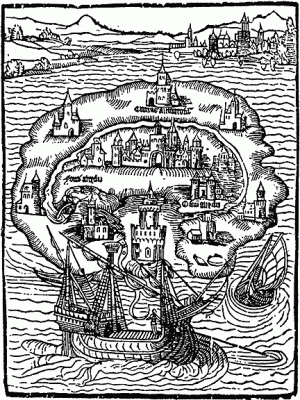For if you suffer your people to be ill-educated, and their manners to be corrupted from their infancy, and then punish them for those crimes to which their first education disposed them, what else is to be concluded from this, but that you first make thieves and then punish them.
That’s perhaps the most famous and beloved quote from Sir Thomas More‘s Utopia. If you haven’t read it yet, you certainly should. You have no reason not to, as a Professor at NYU named Stephen Duncombe has “open-sourced” it.
See, in Utopia, all goods are shared, whether that’s food, clothing, or knowledge. Yet Sir Thomas More’s Utopia, written in 1516, hasn’t been all that widely available. Sure, you can find it on the internet if you look hard enough, but this marks the first time that you can tinker with it yourself.
Using Social Book, a platform created by the Institute for the Future of the Book, users can add their own notes, criticisms, or anecdotes to the text which can be read by everyone. You can also create your own private group, where friends or classmates can add in bits of analysis.
Professor Duncombe has also made the text available in multiple formats, from PDF to eBook to audio book. Sure, Utopia has been in continuous print since its publication nearly 500 years ago, but it grows all the more unattractive a choice as time goes on. Duncombe explains this well as part of his introduction.
Utopia is a hard sell in the twenty-first century. Today we are people who know better, and what we know are the horrors of “actually existing” Utopias of the previous century: Nazi Germany, Stalin’s Soviet Union, Maoist China, and so on in depressing repetition.1 In each case there was a radical break with the present and a bold leap toward an imagined future; in every case the result was disastrous in terms of human cost.
Open Utopia aims to remind us, however, that we still need Utopia, perhaps more than ever. Open Utopia gives us a place to dream up new Utopias using the knowledge of histories past. It’s a boldly optimistic standpoint, but interesting nonetheless.
